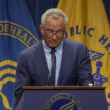President Joe Biden’s administration has taken the same stance as Donald Trump’s on a steel tariffs case, and the U.S. Supreme Court has backed them up.
The Court declined to hear an appeal by USP Holdings – which was rejected by lower courts – claiming that the former president acted improperly when he enacted the tariffs.
The new administration has kept most of these restrictions in place, disagreeing with USP Holdings and other steel importers who said they suffered damage from these policies.
Scott Paul, President of the Alliance for American Manufacturing, said: “The Biden administration understands that simply lifting steel tariffs without any solution in place…could mean layoffs and plant closures in Pennsylvania and in Ohio and other states where obviously the impact would be felt not only economically but politically.”
Trump based his decision to impose restrictions on imported goods deemed essential for national security on Section 232 of the Trade Act of 1962, specifically citing airplanes, ships and military materials made with US-produced steel.
This created tensions between America and its allies, although some countries were exempt from this policy.
Then-Commerce Secretary Wilbur Ross started an investigation into whether or not imported steel was a threat to national security under Section 232 of the Trade Act of 1962, resulting in Trump’s implementation of these tariffs.
The Supreme Court didn’t explain why it denied USP Holdings’ petition but no justices dissented from this order either.
The Supreme Court is expected to deliver rulings this term which may have drastic implications for climate change lawsuits filed by progressive states and cities demanding compensation for damages related to climate change past, present and future according to Boyden Gray.
He reminded us that federal court cannot impose their own environmental agendas on their neighbors due to Justice Ruth Bader Ginsburg’s 2011 ruling in American Electric Power Co v Connecticut
This case delegated greenhouse-gas emissions regulation responsibilities under EPA’s Clean Air Act instead – thus blocking such lawsuits moving forward until SCOTUS decides otherwise now that two cases are pending before them again.
Gray went on warning us that those trying to exploit laws in order to “stick it” to big companies through climate change litigation will suffer a crushing blow if SCOTUS doesn’t rule in their favor since Ginsburg already established federal law taking precedent over state law when it comes air pollution crossing state lines a decade ago already.










